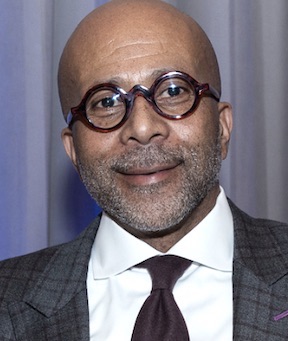On this date in 1964, humanist scholar Anthony Bernard Pinn was born to Raymond and Anne Pinn in Buffalo, N.Y. He grew up going to Baptist and African Methodist Episcopal (AME) churches and decided that he was going to be a minister. He preached his first sermon from the pulpit at age 12 and later transferred from public school to a Southern Baptist high school before enrolling at Columbia University, where he earned a B.A. He worked as an AME youth pastor in Brooklyn and Boston but started to believe that the church had no real answers to people’s problems. “I was moving from this kind of evangelical fundamentalist position to something more along the lines of the social gospel, but it still wasn’t getting it done.” (October 2014 speech at the Freedom From Religion Foundation’s national convention.)
Continuing his studies, he earned a master of divinity degree and a Ph.D. in philosophy from Harvard in 1994. His dissertation title was “ Wonder as I Wonder: An Examination of the Problem of Evil in African-American Religious Thought.” He had been questioning whether God existed and was having issues with theism more than religion. He asked himself, “Do the people matter, or is it the tradition that matters?” He relinquished his minister’s credentials, remaining interested in religion but seeing it as “a force that needed to be wrestled with and understood as a cultural development that shaped world events in some profound ways.” In his first book, Suffering and Evil in Black Theology (1995), Pinn discussed theodicy (why God permits evil) from an African-American perspective. How, he asked, can black theists, particularly black theologians, make sense of a perfect, benevolent God in light of African-American suffering?
After teaching at Gordon-Conwell Theological Seminary, Suffolk University and Macalester College, he accepted an offer in 2003 from Rice University in Houston, becoming the first African-American to hold an endowed chair there as a professor of humanities and religion. Pinn is the founding director of the Center for Engaged Research and Collaborative Learning at Rice and director of the Institute for Humanist Studies in Washington. He’s the author, co-author or editor of more than 35 books, including the Fortress Introduction to Black Church History (with his mother, Anne H. Pinn, an AME minister, in 2001), The End of God-Talk: An African American Humanist Theology (2011), Writing God’s Obituary: How a Good Methodist Became a Better Atheist (2014), Humanism: Essays in Race, Religion, and Cultural Production (2015) and When Colorblindness Isn’t the Answer: Humanism and the Challenge of Race (2017).
His awards include the African-American Humanist Award from the Council for Secular Humanism (1999), Harvard University Humanist Association Humanist of the Year (2006) and Unitarian Universalist Humanist Association Humanist of the Year (2017). He was named a recipient in 2019 of FFRF’s Emperor Has No Clothes Award for speaking truth to power. Pinn’s research interests include humanism and hip hop culture. He married journalist Cheryl Johnson in 2000. They separated in 2005 and divorced in 2015.
PHOTO: Pinn receiving FFRF’s Emperor Has No Clothes Award; Ingrid Laas photo.


